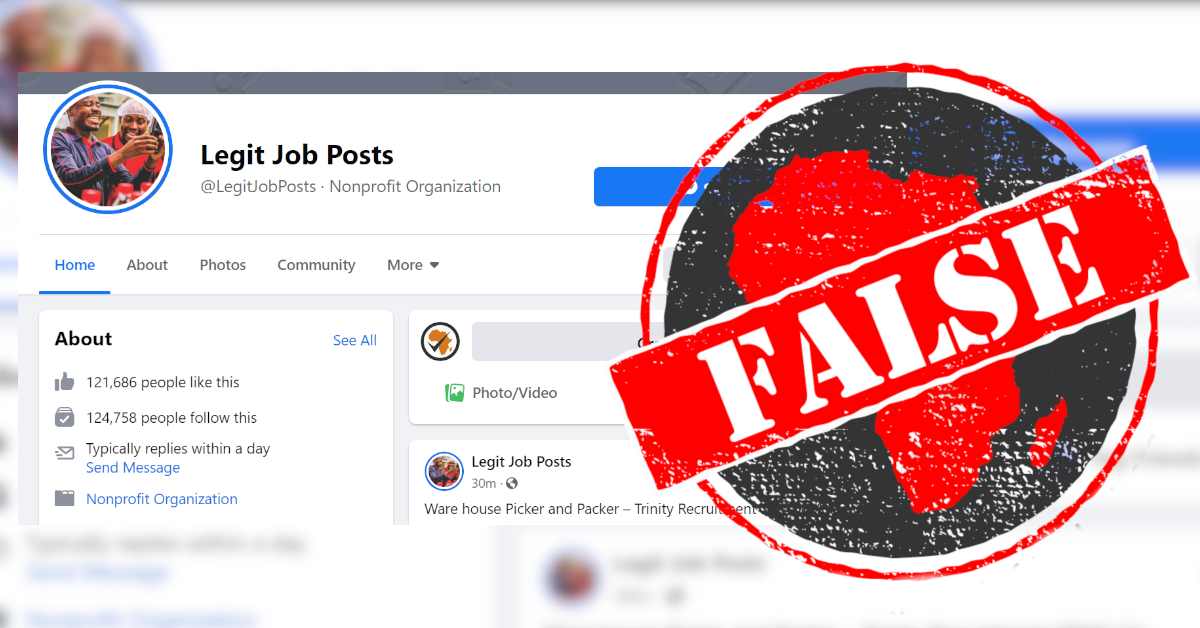The Facebook page “Legit Job Posts” offers jobs at several South African companies – First National Bank, Coca-Cola, Mr Price and Pep clothing and more.
Applicants stand to earn salaries between R6,000 and R13,000 a month and need few to no qualifications to apply.
Each post receives hundreds of comments from unemployed hopefuls. Unfortunately, none of them will find a job on this page. It’s a scam.

Facebook transparency records show the page was created in September 2019. It has more than 120,000 followers.
But the posts on the page are suspicious. Facebook users are asked to share and comment, sometimes with their personal details, for example the province they live in.
This is an example of engagement bait – posts that ask people to interact by liking, commenting or sharing. The more people do this, the greater the Facebook page’s reach.
Some posts include a link that can supposedly be used to apply for a job online but these are all dead ends. Instead of being taken to a legitimate employment website, you are taken to an unrelated, basic-looking website called jobscamp.co.za. It is full of pop-up ads and colourful banners. Africa Check previously investigated the website and found that it’s owner was earning money from views and clicks.
To protect yourself against fake job ads, read our guide to Facebook scams and how to spot them. You can also report suspicious Facebook posts by clicking “report post” on the top right of any post. – Africa Check
Applicants stand to earn salaries between R6,000 and R13,000 a month and need few to no qualifications to apply.
Each post receives hundreds of comments from unemployed hopefuls. Unfortunately, none of them will find a job on this page. It’s a scam.

No links to official employment websites
Facebook transparency records show the page was created in September 2019. It has more than 120,000 followers.
But the posts on the page are suspicious. Facebook users are asked to share and comment, sometimes with their personal details, for example the province they live in.
This is an example of engagement bait – posts that ask people to interact by liking, commenting or sharing. The more people do this, the greater the Facebook page’s reach.
Some posts include a link that can supposedly be used to apply for a job online but these are all dead ends. Instead of being taken to a legitimate employment website, you are taken to an unrelated, basic-looking website called jobscamp.co.za. It is full of pop-up ads and colourful banners. Africa Check previously investigated the website and found that it’s owner was earning money from views and clicks.
To protect yourself against fake job ads, read our guide to Facebook scams and how to spot them. You can also report suspicious Facebook posts by clicking “report post” on the top right of any post. – Africa Check
Republish our content for free
For publishers: what to do if your post is rated false
A fact-checker has rated your Facebook or Instagram post as “false”, “altered”, “partly false” or “missing context”. This could have serious consequences. What do you do?
Click on our guide for the steps you should follow.
Publishers guideAfrica Check teams up with Facebook
Africa Check is a partner in Meta's third-party fact-checking programme to help stop the spread of false information on social media.
The content we rate as “false” will be downgraded on Facebook and Instagram. This means fewer people will see it.
You can also help identify false information on Facebook. This guide explains how.


Add new comment